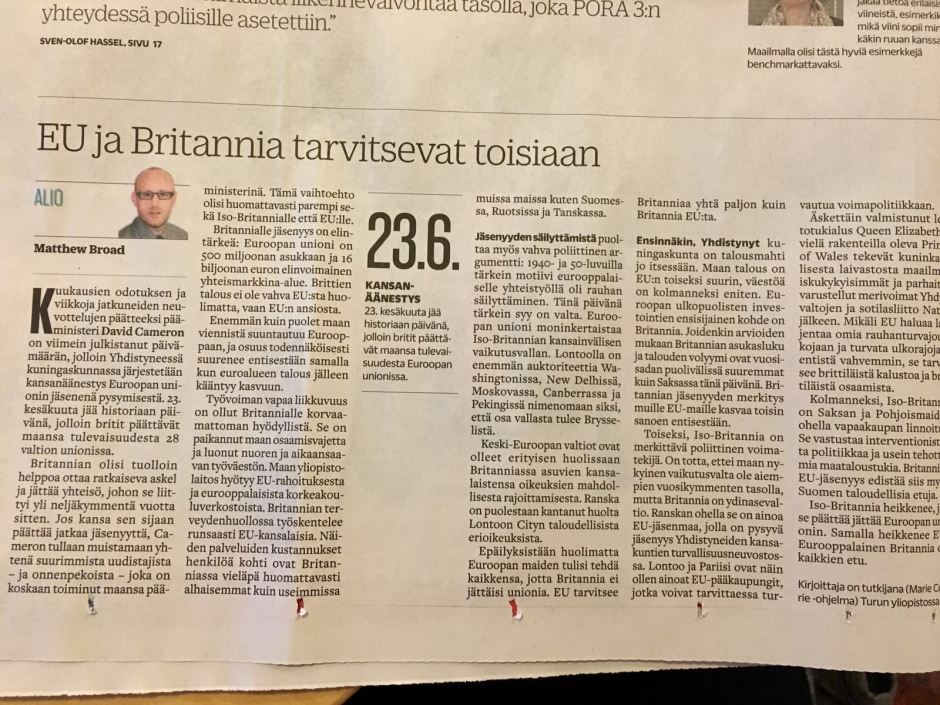 This was originally published in Turku Sanomat on 25 February 2016. The English language version is below.
This was originally published in Turku Sanomat on 25 February 2016. The English language version is below.
After months of waiting and weeks of negotiations, prime minister David Cameron has finally announced the date of the referendum on Britain’s continued membership of the European Union.
On 23 June the British people will decide the fate of the UK’s relationship with the 28-member bloc. Britain could very easily take a decisive step towards leaving a group that it joined over forty years ago.
Alternatively, if people choose to stay, Cameron will go down as one of the most transformative — not to say lucky — prime ministers Britain has ever had. And both Britain and the EU will be much better off.
It is vital for Britain to remain. The EU is a large and vibrant single market of 500 million people worth $16.6 trillion. Britain has a strong economy because of, not despite, this. Over half of Britain’s total exports are sent to other European countries, and this will likely only increase as euro members return to growth.
Membership also represents a huge opportunity for the UK to secure investment, with many companies choosing to base their European headquarters in Britain. Free movement has been incredibly beneficial to the UK, plugging skill gaps and creating a young, vibrant work force. Its university system benefits from EU funding and Europe-wide higher education networks. Its healthcare system is staffed by a huge number of EU citizens.
And for all this the UK pays far less per person than most other countries, including Finland, Sweden and Denmark.
There is also a strong political argument in favour of staying. In the 1940s and 1950s the main reason for European states to cooperate was for peace. Today it is for power.
The EU multiplies Britain’s influence in the world. London has more authority in Washington, New Delhi, Moscow, Canberra and Beijing precisely because it is part of the apparatus in Brussels.
Persuading other EU states to support the renegotiations has not been easy. Central European states are especially worried that their citizens resident in Britain will have their benefits restricted. France is also worried about special protections for the City of London that will not cover its own financial sector.
But these countries should do all they can to help keep Britain in. For the EU needs Britain as much as Britain needs the EU.
First, the UK is a large economic power in its own right. It has the EU’s second largest economy, its third largest population, and it is the first destination for most global investment in Europe.
According to some, by the middle of the century Britain will have a larger population and economy than Germany does today. British membership will therefore only become more important to other EU members.
Second, the UK is a huge political power. Admittedly it does not have the same weight it has had previously. But the UK is a nuclear armed state. Together with France it is Europe’s only permanent member of the UN’s Security Council. This means that, besides Paris, London is the only other capital that is able to project its power by force.
The building of two new aircraft carriers — HMS Queen Elizabeth and HMS Prince of Wales — will make the Royal Navy the most feared and well equipped sea force in the EU, and second only to the United States in NATO. If the EU wants to extend its own peacekeeping force and secure its own external borders, it needs British equipment and British knowhow.
Third, Britain, along with Germany and the Nordic states, is a bastion of free trade. It helps guard against interventionist politics and often wasteful agricultural subsidies. Finland is better off financially in the EU because Britain is also a member.
Britain will be worse off it does not decide to stay in June. But so will the EU. It is therefore in everybody’s interest that it stays.